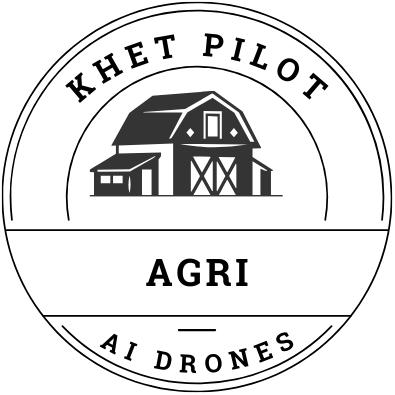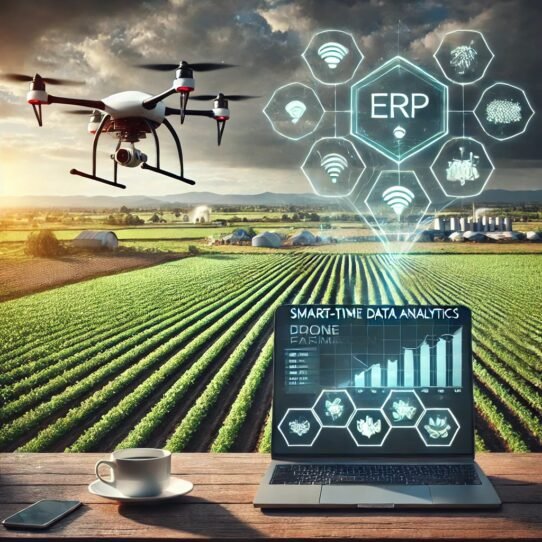The rapidly developing field of drone tech in agriculture has set the tempo of change, especially for B2B operations oriented toward fine-tuning, optimization, and subsequent scale-ups of the processes.
Therefore, drone technology becomes one of the promising dynamic data sources integrated with ERP systems. This integration has guided farms to become efficiently operating, data-driven enterprises. It already provides significant value to agribusinesses. This value spans everything from crop health monitoring to resource allocation and compliance. Additionally, it is likely to continue delivering overwhelming benefits in the future.
Why B2B Agricultural Enterprises Need Drone Tech and ERP Integration
Agricultural B2B operations are always teetering on the thin line between productivity and sustainability while executing complex data management related to resource supply, prevailing weather conditions, crop health status, and many other factors.
That is where drone tech comes into the equation. Pairing up with an ERP system, drone tech automates the collection of data, presents data visualization of farm data, and drives actionable insights in business dashboards. Here’s the reason why it happens.
| Benefit | Description |
| Advanced Crop Health Analysis | Drones capture high-resolution imaging data for ERP to analyze crop health metrics and ensure prompt response to emerging issues. |
| Efficient Resource Allocation | This implies that ERP makes accurate use of resources based on data that a drone collected, thus saving resources and maximizing output. |
| Enhanced Forecasting Capabilities | Historical ERP data together with real-time inputs from drones can now give agribusinesses a better indication and scheduling of crop yields. |
| Sustainable and Eco-Friendly Farming | The insights from drones help B2B farms optimize the utilization of resources to track the quality of soil and lower the general impact on the environment. |
| Regulatory Compliance | The records can thus be kept simply through the drones that provide clear, accurate information for ERP systems to generate compliance reports automatically. |
Key Applications of Drone Tech in B2B Agricultural ERP Systems
- Real-time crop monitoring
Utilizing multispectral and thermal imaging, agri drones provide the vital crop health data for ERP systems. A live feed of data allows remote managers to respond quickly and precisely to issues, from irrigation requirements to pest infestations.
- Precision resource management
Agri drones provide detailed data for an ERP to act upon so that inputs are managed to exist virtually through its optimization—-often water, fertilizers, and pesticides. Such focused approaches help B2B entity operations take productivity maximization alongside weighing costs.
- Smooth compliance and paperwork
Although there can be significant pressure from regulatory bodies on B2B agricultural operations, drone tech offers advantages for compliance. Drones provide historical data directly to ERP systems. This makes auditing easier and reduces the burden of risks associated with non-compliance fines.
- Enhance forecasting and predictive analysis
This method, in turn, causes the ERP system to notify on yield forecasting, planting dates, and harvest times based on the insights gleaned from the data developed by the drones. Furthermore, such predictive information also accommodates the supply chain since the production capacity coincides with demand requirements, therefore eliminating waste.
- Lowered environmental impact
Drones give sustainability-minded agribusinesses an edge. In addition, they enable ERP systems to track and manage the water, air, and land footprint of farm operations. This also includes estimating water conservation needs and monitoring soil health metrics.
Drone Tech in Agriculture: Key Insights from the Study
The table is illustrative of a study that highlights key aspects of agriculture drone use in automated pesticide spraying. It covers cost and efficiency improvements, advanced features, and health benefits for farmers. Additionally, it provides details on the drone’s capacity, range, purchase, and rental prices.
| Aspect | Details |
| Primary Use | Drone tech enables automated pesticide spraying to reduce health risks, save time, and cut labor costs. |
| Cost | Rs 350-450 per acre for a drone with a 10 kg payload, covering 30 acres/day. |
| Efficiency | 25-30% reduction in input costs; 80-90% water savings. |
| Time | 5-7 minutes per acre, compared to 3-4 acres per day manually. |
| Capacity & Weight | 10 L tank capacity; weight 12-13 kg (standalone), up to 25-27 kg when loaded. |
| Range & Height | 5 km range (restricted to 500m), 120 ft max altitude (restricted to 30 ft). |
| Advanced Features | Automatic height adjustment, obstacle radar, flow meter, night vision. |
| Farmer Health Benefits | Reduces risks from snakebites and respiratory diseases |
| Cost of Drone | Rs 0.7-0.9 million INR for purchase, Rs 600-700/acre for rental. |
FAQs
In what way does drone technology enhance the Effectiveness of ERP systems for agricultural businesses?
By implementing drone technology in ERP, agricultural enterprises can enhance operational efficiency. This is due to easy access to current and objective information. The data provides a clear view of the actual situation in the field in real-time.
Would you say that drone technology is appropriate for every level of agribusiness?
Indeed, whether it is a limited resource cooperative or vast commercial agriculture, drone technology can be adapted to certain data, which helps organizations of any scale operate effectively.
How does drone technology affect social corporate responsibility?
Drones facilitate the implementation of precision farming. Additionally, they allow green economy operators to access resources only when needed. This approach helps eradicate resource wastage.
Conclusion
Incorporating drone tech into ERP systems is a powerful step for B2B agribusinesses looking to stay competitive, sustainable, and efficient. Drones offer an aerial advantage, capturing crucial data that ERP systems analyze and transform into clear, actionable insights.
As a result, with drone tech integrated into ERP, agribusinesses gain not only improved crop management and compliance but also a reliable path to sustainable growth. Ultimately, for any B2B agricultural operation, this combination is not just a technological upgrade; it’s a strategic evolution toward the future of farming.

